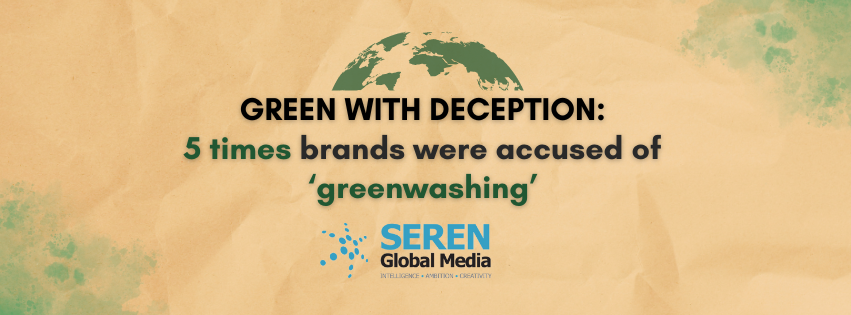Green with deception: 5 times brands were accused of ‘greenwashing’

In the name of sustainability and environmental consciousness, many brands have embarked on ambitious campaigns aimed at portraying themselves as eco-friendly and responsible stewards. However, some of these campaigns have been met with skepticism and accusations of "greenwashing," where companies exaggerate or misrepresent their environmental credentials to appear more sustainable than they actually are.
With Earth Day on the horizon and ‘green-marketing’ at the helm of every upcoming brand strategy, we revisited occasions where brands may have got too carried away in the boardroom:
Volkswagen's "Clean Diesel" Deception
In the early 2000s, Volkswagen launched a massive advertising campaign positioning their diesel vehicles as environmentally friendly due to their low emissions. They promoted their cars as "clean diesel" options, claiming they met strict environmental standards. However, many years after in 2015, it was revealed that Volkswagen had installed software in their vehicles to cheat emissions tests, allowing them to emit pollutants far above legal limits during normal driving conditions. This scandal, later coined "Dieselgate," exposed Volkswagen's deceptive practices and highlighted the dangers of greenwashing in the automotive industry.
H&M's Conscious Collection H&M
As a renowned retailer and fashion giant, H&M introduced its "Conscious Collection" as part of its sustainability efforts. The new collection was marketed as eco-friendly with it using materials like organic cotton and recycled polyester, suggesting a commitment to sustainable fashion. However, critics pointed out that H&M's overall business model of fast fashion, characterised by rapid production and consumption of clothing, massively contradicted the principles of true sustainability. The Conscious Collection was seen by some as a greenwashing tactic to divert attention from the brand's broader environmental impact.
Nestlé's "Green" Bottled Water
Nestlé, perhaps one of the world's largest food and beverage companies, launched its "Eco-Shape" water bottle claiming to be more environmentally friendly due to its reduced plastic content. Despite its green intentions, Nestlé continued to face criticism for its extraction of water from areas experiencing water scarcity and its reliance on single-use plastic packaging.
Critics argued that Nestlé's focus on a slightly lighter plastic bottle ignored larger issues at hand, trying to overshadow topics like water resource management and plastic pollution, thus prompting accusations of greenwashing.
BP's "Beyond Petroleum" Rebranding
In 2000, oil giant BP launched a high-profile rebranding campaign, adopting the slogan "Beyond Petroleum" and introducing a new green and yellow sunburst logo. BP emphasised its investments in renewable energy sources like solar and wind power, presenting itself as a leader in the evolving move to cleaner energy. However, BP's core business remained heavily reliant on fossil fuels, and the company faced significant environmental controversies, including the Deepwater Horizon oil spill in 2010. Critics argued that BP's rebranding was a strategic move to improve its public image, distracting consumers from the company’s negative impact on climate change – a classic crisis tactic.
Nike’s “Move to Zero” fail
After years of protest against its low labour costs and several scandals related to sweatshops in Indonesia, Nike made drastic changes to its company culture, and is now widely considered a champion of sustainability. However, Nike’s recent “Move to Zero” campaign sparked widespread greenwashing claims.
Hinging on the idea that there is no sport without a healthy planet, the campaign sets the scene for Nike’s move towards zero carbon and zero waste. Seemingly promising, the campaign was ironically thought to be ‘recycled’, merely repackaging old commitments without offering anything new. In an interview with a magazine, Nike’s Chief Sustainability Officer Noel Kinder himself admitted that some of the targets the company had set – like diverting 99% of all footwear manufacturing waste from landfills by 2020 – were not entirely realistic and may pose more difficulty than expected.
How can we help?
Messages are powerful, especially when realised with precision and realistic goals in mind. Contact us today and let us help your company craft compelling campaigns that resonate and drive tangible results.
Archive
2025 (11)
June (1)
May (2)
April (2)
March (2)
February (2)
January (2)
2024 (21)
December (2)
November (1)
October (1)
September (2)
August (1)
July (2)
June (1)
May (2)
April (3)
March (2)
February (1)
January (3)
2023 (27)
December (1)
November (3)
October (3)
September (2)
August (4)
July (2)
June (3)
May (1)
April (2)
March (3)
February (3)
2022 (21)
December (3)
November (1)
October (2)
September (3)
August (1)
July (2)
June (1)
May (1)
April (1)
March (2)
February (1)
January (3)
2021 (25)
December (2)
November (1)
October (3)
September (2)
August (2)
July (2)
June (3)
May (2)
April (2)
March (2)
February (2)
January (2)
2020 (20)
December (2)
November (3)
October (1)
September (2)
August (1)
July (2)
June (1)
April (2)
March (2)
February (2)
January (2)
2019 (22)
December (2)
November (2)
October (2)
September (3)
August (3)
July (2)
June (2)
May (2)
April (3)
January (1)
Latest News/Blog
Has influencer marketing killed good PR?
20 June 2025
Why Press Relations are key for your business in 2025
29 April 2025